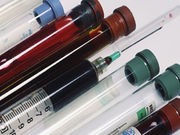Results of test don’t seem to alter survival rates, even five years after transplant
WEDNESDAY, June 22, 2016 (HealthDay News) — The troponin I blood test that’s used to check the health of a donor heart may not accurately predict if a heart transplant will be successful, according to a study published online June 21 in Circulation: Heart Failure.
“If the heart looks OK but troponin I is elevated, many centers will reject the organ out of concern that this marker indicates dysfunction of the heart that will become evident after the stress of the transplant process,” senior author Snehal Patel, M.D., of the Montefiore Medical Center and Albert Einstein College of Medicine in New York City, said in a journal news release. “We looked at whether this is true.”
For the study, the researchers looked at how well U.S. patients did after 10,943 heart transplant surgeries. The patients were all 18 and older. The investigators found no association between donor troponin I levels and the risk of death during the year following transplant. In addition, donor troponin I levels had no significant effect on recipients’ survival at 30 days, one year, three years, or five years. Troponin I levels also didn’t appear to affect the risk of serious complications.
“Our research shows that transplant centers should not exclude donor hearts based solely on elevated troponin I if the organ is otherwise suitable,” Patel said. “At our institution it has already changed how we evaluate donors, and I think this data will lead to changes nationwide.”
Copyright © 2016 HealthDay. All rights reserved.








